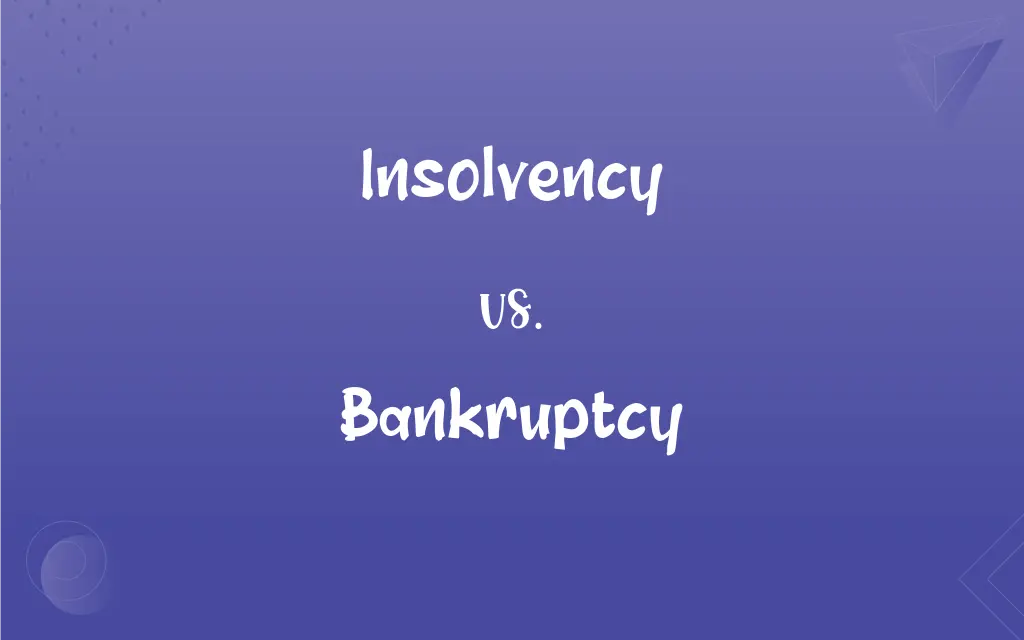Insolvency vs. Bankruptcy: What's the Difference?
Edited by Aimie Carlson || By Janet White || Published on November 28, 2023
Insolvency is the financial state of being unable to pay debts, while Bankruptcy is a legal process that resolves insolvency and discharges certain debts.

Key Differences
Insolvency describes a situation where an individual's or company's liabilities exceed their assets. On the other hand, Bankruptcy is a formal legal declaration and process that can be initiated due to insolvency.
Insolvency can be temporary and might be resolved without legal intervention. In contrast, Bankruptcy is a structured process overseen by the courts to manage and, if possible, resolve insolvency.
Both Insolvency and Bankruptcy can have severe consequences on one's financial health. While Insolvency highlights a lack of liquidity, Bankruptcy usually involves legal judgments, asset liquidation, and a lasting impact on credit history.
Insolvency can lead to Bankruptcy, but not all insolvencies result in Bankruptcy. It's possible for entities to navigate insolvency without resorting to the formal Bankruptcy process.
Entities might work with creditors during Insolvency to find mutual resolutions. However, once Bankruptcy is declared, it involves legal proceedings, court mandates, and often involves the appointment of trustees to manage the debtor's assets.
ADVERTISEMENT
Comparison Chart
Definition
Financial state of being unable to cover debts.
Legal process to address insolvency and discharge debts.
Nature
Describes a financial condition.
Formal legal process.
Outcome
Can be temporary; might lead to Bankruptcy.
Results in legal judgments, possible asset liquidation, and credit implications.
Intervention
Can potentially be resolved without courts.
Involves court proceedings and legal mandates.
Creditors' Involvement
Entities may negotiate directly with creditors.
Once initiated, creditors must abide by the court's decisions, often involving a pause on debt collection.
ADVERTISEMENT
Insolvency and Bankruptcy Definitions
Insolvency
Indicates when liabilities exceed assets.
John's insolvency was evident when his debts surpassed his earnings.
Bankruptcy
Comes in different forms, e.g., Chapter 7 (liquidation) or Chapter 11 (reorganization).
The corporation opted for Chapter 11 bankruptcy to restructure its debts.
Insolvency
Can be a precursor to Bankruptcy.
The prolonged insolvency of the firm eventually led them to consider bankruptcy.
Bankruptcy
Can severely impact credit scores and histories.
His bankruptcy remained on his credit report for ten years.
Insolvency
Affects credibility and might limit access to credit.
Their insolvency made it difficult to secure new loans.
Bankruptcy
A means to discharge or restructure debts.
Jane filed for bankruptcy to get relief from overwhelming medical bills.
Insolvency
Insolvency is a financial state where debts can't be met when due.
The company faced insolvency after a series of poor investments.
Bankruptcy
Involves court proceedings and might require trustees' involvement.
During her bankruptcy process, a trustee was appointed to oversee the asset distribution.
Insolvency
The condition of being insolvent.
Bankruptcy
Bankruptcy is a formal legal procedure addressing insolvency.
After months of financial struggle, the company filed for bankruptcy.
Insolvency
An instance of being insolvent.
Bankruptcy
The state of being bankrupt.
Insolvency
(finance) The condition of being insolvent; the state or condition of a person who is insolvent; the condition of one who is unable to pay his debts as they fall due, or in the usual course of trade and business.
The company faces insolvency.
Bankruptcy
A legal proceeding that allows for a person or entity to be declared bankrupt.
Insolvency
Insufficiency to discharge all debts of the owner.
The insolvency of an estate
Bankruptcy
The system of adjudication that declares instances of bankruptcy
Went into bankruptcy.
Insolvency
The condition of having more debts than assets.
Bankruptcy
A legally declared or recognized condition of insolvency of a person or organization.
Insolvency
The condition of being insolvent; the state or condition of a person who is insolvent; the condition of one who is unable to pay his debts as they fall due, or in the usual course of trade and business; as, a merchant's insolvency.
Bankruptcy
The state of being actually or legally bankrupt.
Insolvency
The lack of financial resources
Bankruptcy
The act or process of becoming a bankrupt.
Insolvency
Not always a permanent state; might be navigated with strategic decisions.
With some timely asset sales, the business overcame its brief insolvency.
Bankruptcy
Complete loss; - followed by of.
Bankruptcy
A state of complete lack of some abstract property;
Spiritual bankruptcy
Moral bankruptcy
Intellectual bankruptcy
Bankruptcy
Inability to discharge all your debts as they come due;
The company had to declare bankruptcy
Fraudulent loans led to the failure of many banks
Bankruptcy
A legal process intended to insure equality among the creditors of a corporation declared in bankruptcy
FAQs
Is Bankruptcy the same as Insolvency?
No, while Insolvency is a financial state, Bankruptcy is a legal procedure addressing that state.
Is Insolvency always a precursor to Bankruptcy?
No, not all insolvencies lead to Bankruptcy. Some can be resolved without legal proceedings.
Can a company operate during Insolvency?
Yes, a company can operate during Insolvency and might find ways to navigate its financial difficulties.
What happens to assets during Bankruptcy?
Depending on the bankruptcy type, assets might be liquidated to pay creditors or protected under restructuring plans.
Can an individual declare Insolvency?
An individual can be insolvent, but one doesn't "declare" insolvency like they might declare bankruptcy.
Can Insolvency be resolved?
Yes, with financial adjustments, negotiations, or external investments, Insolvency might be resolved.
What causes Insolvency?
Multiple factors can, from poor financial management to unforeseen expenses or economic downturns.
What does Insolvency signify?
Insolvency indicates a situation where an individual or entity can't meet its financial obligations.
What protections does Bankruptcy offer?
Bankruptcy can halt debt collection efforts, prevent lawsuits, and provide a structured way to address debts.
Can Insolvency be predicted?
Financial indicators might hint at approaching Insolvency, but predicting with certainty is challenging.
How does Bankruptcy affect credit?
Bankruptcy has a negative impact, often remaining on a credit report for 7-10 years.
How often can one file for Bankruptcy?
Legal limits exist; for instance, after a Chapter 7 bankruptcy, one must wait eight years to file again.
Can businesses recover after Bankruptcy?
Yes, especially with Chapter 11, businesses can restructure and continue operations.
How does one start the Bankruptcy process?
It often begins by consulting with a bankruptcy attorney to determine the best course of action.
Is it bad to file for Bankruptcy?
While it has negatives, such as credit impact, it can offer relief and a fresh financial start for some.
How long does Insolvency last?
It varies; some entities navigate it quickly, while others may remain insolvent longer or opt for bankruptcy.
Is Insolvency a public record?
While Insolvency itself isn't, related proceedings or declarations, like Bankruptcy, become public records.
Are there alternatives to Bankruptcy?
Yes, debt counseling, negotiations with creditors, and debt consolidation are a few options.
Do all creditors get paid during Insolvency?
It depends on the assets available; some might receive partial payments or none at all.
Does Bankruptcy eliminate all debts?
No, certain debts like student loans and alimony might remain even after bankruptcy.
About Author
Written by
Janet WhiteJanet White has been an esteemed writer and blogger for Difference Wiki. Holding a Master's degree in Science and Medical Journalism from the prestigious Boston University, she has consistently demonstrated her expertise and passion for her field. When she's not immersed in her work, Janet relishes her time exercising, delving into a good book, and cherishing moments with friends and family.
Edited by
Aimie CarlsonAimie Carlson, holding a master's degree in English literature, is a fervent English language enthusiast. She lends her writing talents to Difference Wiki, a prominent website that specializes in comparisons, offering readers insightful analyses that both captivate and inform.






































































